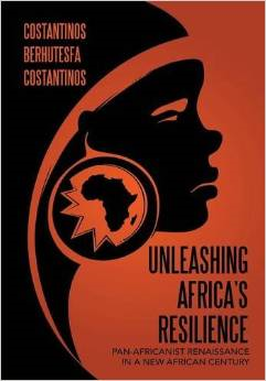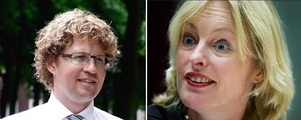 In the past week we as a family had the opportunity to go back to Ethiopia, where we lived from 2001-2007 and where our children went to school. The school Bingham Academy organised a reunion and the children had the opportunity to reconnect with their class mates. We once again realised how much they have gained by living abroad and interacting with peers from so many nations and cultures. Coincidentally during this trip I ran into Prof. Costy Costantinos, an influential pan-africanist whom I had met earlier in the year. Both of us are members of an International Coordination Council of Civil Society Politics. We agreed to have a coffee next day and Costy handed me his new book "Unleashing Africa's Resilience". What a privilege to receive the fifth volume of a series of textbooks that will be a treasure for African students at universities all over the continent. Costy's breadth of information is incredible and depth of analysis not compromising his African roots. The book depicts an African re-naissance lead by African children, women and men (in that order). Taking the reader through philosophical foundations for an African Renaissance, Prof. Costantinos describes the developmental state and its potential for transformation, showing that developmentalism carries a problematic theory of modernity. He identifies the research, policy and practice nexus as potential arena for institutional pathways towards civic participation, looking for meritocratic governance that emphasizes talent and education. However, the book also takes account of global economic forces that lead to economic adjustment, multinational resource plunder and coup d' états in Africa (featuring case studies from Algeria, DRC, Egypt, Ethiopia and Nigeria). Organizational autonomy, capacity, complexity and cohesion Pointing to the need for self-governance and local institutions along with certification of natural resources Costantinos offers an alternative framework for development. A whole chapter is dedicated to the rise of political Islam and "biblical" citizen states illustrating the global clash of cultures. Reflecting on the Arab 'spring' he describes the impact on civil society as well as governance. Civil society as agent or object of islamization politics. The state capture by political élite and the analysis of the role of external forces together with the absence of an effective civil society provide the colors that draw a grim picture of African democratic potential. According to Costantinos, civil society is effective by virtue of its autonomy, capacity, complexity and coherence. The state itself has a limited role to play in democratic reform which should come from below. However, in situations where the state is weak surprisingly Costantinos is pointing to the army as the preferred partner in leading democratic change processes. "Democratic reform is least likely in personalistic, neo-patrimonal regimes where state élite have routinely violated the rule of law with impunity. The prospects for a democratic transition improves to the extent that state apparatus contains organizations that are autonomous (from the executive branch), capacious, complex and cohesive. An organization that shows the greatest strenght on these dimensions, is likely to become the lead organization in the state to promoting democratic reform. In this regard, state-led transitions are most likely in military regimes as part of a planned return to civilian rule." Costantinos, 2014 p 225  Prof. Costantinos Prof. Costantinos Reflecting on the Arab-African context Costantinos points to the emergent Islamization of Politics through the cultivation of civil society through Islamic education. The assumption that having as many ethnic and religious perspectives on board is an index of pluralism of politics may be flawed, as capacities and levels of organization differ greatly as well as commitment to pluralism Costantinos argues. "The proliferation of citizen-states over the last decade has been more an outcome of funding by Gulf States than an indigenous grassroots phenomenon." While discussing the potential for an African renaissance Costantinos points once again to the role of civil society. "Though a rich associational life characterizes African society, this does not imply the presence of a strong civil society." However, he argues, governments should not assign themselves a role to "cultivate civil society" through political education and mobilization (p 572). Instead he emphasizes the need for leaders to have zeal, commitent, diligence, greatness of spirit, consistency and strengh to transform transitional chaos into development opportunities that history will judge them for. Unleashing Africa's Resilience exposes also what Costantinos calls naive realism that beliefs that political process could precede political dialogue and culture. The belief that ballot boxes and election campaigns could trigger political engagement at sufficient scale to treadle the path of democracy. The developmental state carries deeply entrenched attitudes that turns to outsiders for support of the political process rather than allowing for a home grown political culture and the birth of institutions that capture and represent this culture. Instead a 'sloganizing' form of democracy has emerged copying western democracies which in turn are eroding as a result of it.  Mr. Sander Dekker and Mrs. Jet Bussemaker Mr. Sander Dekker and Mrs. Jet Bussemaker Internalisation of education In the same week that Costy and I had our conversation, the Dutch Secretary of State for Higher Education, Mr. Sander Dekker, discussed his plans for the Internationalisation of Higher Education in the Netherlands with parliament. What dominated the discussion about his plans is the desired contribution of internationalisation to the Dutch economy. In other words, it was not considered a very positive thing if people would study in the Netherlands and bring their skills and experience back to their home country or to other places in the world. The Secretary emphasized the need to retain talented people for the further growth of the Dutch economy. From an investment point of view, as a public servant, Mr. Dekker has a point. I just hope that Africa will likewise expect some return on investment while educating their youth or sending them abroad. If they consider at all traveling abroad for some exchanges with their European colleagues, let it contribute to the unleashing of Africa's potential. It may produce the 'competent rebels' that Mr. Dekker's Minister Jet Bussemaker talked about in her vision document (googletranslate) earlier in the year, echoing the call of Dymph van den Boom of the University of Amsterdam to bend the top-sector agenda propagated by the liberals towards a human capital agenda. This plea was confirmed by the Scientific Council for Government Policy in their report 'Towards a Learning Economy' and subsequently reported to OECD. It resembles the Finnish model that values creativity and outcome above process. If successfully implemented, it could transform future leaders to exhibit the thought leadership and strategic thinking that Prof. Costantinos contributes towards policy makers of the Africa Union. Wishing both Africa and Europe a prosperous and blessed 2015 as well as numerous cross-linkages in educational terms. (on January 18 Addis Voice accused Prof. Costantinos of purchasing two of his degrees) |
About meMy name is Reinier van Hoffen. U®Reading
Click here for a summary.
Also find the text of a lecture Dr. Achterhuis held at the 2012 Bilderberg conference. Archives
August 2022
|
AddressNachtegaallaan 26
Ede, the Netherlands |
Telephone+31 (0)6 1429 1569
|
info@uraide.nl
|
 RSS Feed
RSS Feed
















